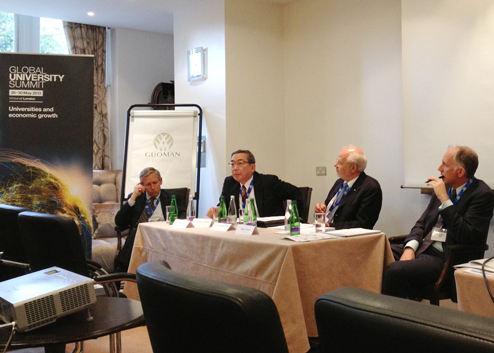‘Cooperate with business’ say university leaders at summit

Speakers at a lead discussion of the 2013 Global University Summit
On May 28th to 30th, the 2013 Global University Summit was held at the University of Warwick in London. Universities from over thirty countries were represented. During the three-day summit, more than 50 speakers discussed topics under the theme “universities and economic growth”, including how universities drive economic growth globally and the close connection between academic studies on emerging countries and economic development. Recently, Global University Summit: Universities and Economic Growth, a report summarizing the proceedings of the summit, was made available on the event’s official website.
“Higher education has, for centuries, been at the vanguard of globalism with academics and students swapping ideas and spreading innovation long before the current system of economic globalization emerged,” wrote Nigel Thrift, chair of the 2013 Global University Summit and vice-chancellor and president of the University of Warwick, in a preface to the report. Professor Thrift said pointedly that the global economic system is in trouble, and to overcome the obstacles it faces will require a joint effort beyond that of any individual actor, organization or even national government. Thrift called for a global response involving international collaboration between states, citizens, businesses and ideas.
Along these lines, the report cited Asian and Latin American governments’ encouragement of cooperation between universities and industries “to propel economies with cutting edge technologies.” It noted that Western universities are also adopting a more commercial outlook under the face of economic pressures.
Still, the report stressed the need for more close interaction between business and universities in order to cultivate graduates prepared for today’s job market. “(A)ppreciation of technology must become part of the curriculum and courses designed for a more well-rounded education.” It also advised that creating a well-equipped workforce will both contribute to a better employment rate, and keep higher education attractive. On the flip side, universities that do not give sufficient consideration to staying abreast of the market’s demands will have fewer applicants. The report suggested that higher education strengthens cooperation with businesses through joint research and cross funding.
Another point made at the conference was that universities themselves are major sources of employment and engines of the local and regional economies where they are located. Observing that his own university employed a faculty and staff of some 5,000, Thrift noted that students pump a lot of money into the local economy, for instance through encouraging the rental industry, and that the numerous construction projects on university campuses also contributes to a thriving local construction industry and its offshoots. Last but not least, he pointed to the amount of value universities add as sources of research and development.
Another key focus of the summit and the report was the changing nature of world order. Where global wealth was once concentrated in the Western economies, the report said, “(p)olitical influence is moving eastwards and towards Latin America as their populations grow and consumption rises.” According to Thomson Reuters, this pattern holds true for university research as well. Reuters’ report Building BRICKS: Exploring the Global Research and Innovation Impact of Brazil, Russia, India, China, and South Korea described BRICK nations (with South Korea and not South Africa) as “the most significant growing influence in the global economy and research landscape.”
The Global University Summit has been held every year since 2008. This year’s summit was cohosted by Thompson Reuters, Times Higher Education and Universities UK International Unit. In addition to the report, delegates prepared a declaration of commitment and policy recommendations for the G8 summit that took place last week.
The Chinese version appeared in Chinese Social Sciences Today, No. 461, Jun.10, 2013
Edited by Zhang Mengying
